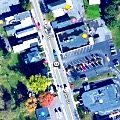- By Alison Lonsky
- Around Town
 Print
Print  Innovative Technology Expands Media Class Offerings
Innovative Technology Expands Media Class OfferingsThe Groton Education Fund Grant recently awarded teachers Mick Levick and Chad DeVoe funding for an unmanned flying vehicle or drone to be used for videography and a variety of educational purposes that will be incorporated into classroom curriculum as early as next semester.
Groton's Digital Media class teacher Mick LeVick said "We are trying to integrate the latest technology, especially as is has to do with video and digital media. Drone technology will really take our digital filming to the next level."
The new equipment will provide opportunities for filming from different perspectives and the digital media lab will be able to immediately apply the drone digital footage to current projects. Other topics such as directional thinking, the science behind flight, rotating speed and acceleration are learning opportunities the new equipment purchase will open up for exploration among classrooms.
Since there is not much legislation regarding use, problem solving and critical thinking will also be discussed as it relates to drone usage and development. Congress has ordered the FAA to establish airspace rules for drones as more and more are being developed for both personal and commercial use. As recently as December 14, 2015 the FAA announced its rules for drone registration. Armed with cameras and other sensors drones capture aerial footage and survey large patches of land from a bird's eye view.
As drone technology improves and the costs shrink, the demand for them has increased dramatically and is expected to rise. New possibilities for their use are being developed as drones become incorporated into modern life. From capturing news video to delivering packages, the technology has many creative and functional uses. A bonus to the new equipment purchase in Groton will be the many ways of engaging students with lesson plans that develop skills relevant to up and coming careers.
Chemistry Teacher Weights In and Measures Up
Groton Jr/Sr high Chemistry and Physics teacher Jackie Baxendell recently was awarded funding from the Groton Education Fund Grant to purchase additional electronic scales and mechanical balances to enhance her classroom.
"Electronic scales do have limitations in that they round off internally to the nearest tenth of a gram," Baxendell said. "If the scale produces an electronic reading of 5.2 this could potentially be a reading of 5.15 or 5.24, these possibilities can lead to a discussion of significant digits and which way to round the number."
When discussing weights and measures, what the range is, the best way to express the actual weight, and why all that matters are considerations taken into account in Baxendell's science class. Currently, the high school has electronic scales in the chemistry lab although there are four science rooms and an additional classroom space used for science-based learning.
"We will still be sharing, but the new scales will give the other classes more opportunities to use electronic scales as well as the mechanical scales. This allows the students to see the differences to compare and contrast" Baxendell said.
Because more classes will have access to the equipment, the new scales will offers more flexibility for classroom projects. Ms. Baxendell researched the most reasonably priced scales and applied for grant funding to access the funds needed for the purchase. The approved new equipment will be utilized by 7-12 grade classes for a variety of science pursuits.
v11i48



